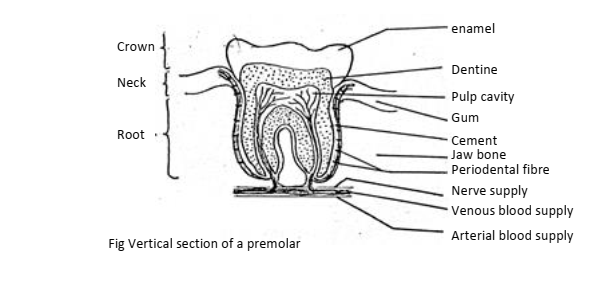The mouth comprises of two jaws, the fixed in the mouth lower jaw. They bear teeth, used for mastication, There lies a muscular tongue between the two halves of the lower jaw. It assist during mastication, food tasting and speech .
The roof of the bucal cavity is called the hard palate. The front portion is softer, called the soft palate.
Digestion in the mouth
It is both physical (mechanical) and chemical (enzymatic). The teeth masticate (chew) the food, reducing it into smaller sizes. This increases the surface area for enzymatic digestion of the food. Physical digestion occurs on every food type, irrespective of the class.
Chemical digestion is done by the enzyme ptyalin (salivary amylase).it acts on cooked starch, hydrolyzing it first into dextrin, then to maltase(a disaccharide).this chemical digestion in the mouth occurs on carbohydrates only.
Salivary amylase (ptyalin) is one of the constituent of saliva. The on the components are lysosymes; NaCl;NaHCo3, , , SCN and mucus.
The lysosymes help in the catalyzing the lysis of bacterial walls while the mucus helps stick food together after chewing, forming toil (singular: tolus) for easy swallowing
Human Dentition and Dental formula
Humans have two sets of teeth; milk or deciduous teeth and permanent teeth. The milk teeth appears first. Then , progressively, they are replaced by the permanent teeth.this conditions i.e termed diplohyodont.
In terms of shapes and seizes(or types), humans(and their mammals) four types of teeth. they are incisors, canines, premolar and molars. This condition is termed heterodont dentition (as opposed to hemodent dentition in fishes, amphibians and reptiles)
A tooth is typically structured as follows

Dental formula: this a summary of the number of each kind of teeth in one half of the upper and
lower jaws. The dental formula of as adult human is
![]()
letters I, C, pm and m stand for incisors, canines, predons and molar respectively. this formular is interpreted thus: in each half of the mouth, there are two outside the trackets should be used tomultiply ll the figures within the baskets to come up with the total number of teeth.
Swallowing
This is the process by which food in the bucal cavity is moved into the esophagus. Initially, it is a voluntary action, but once begun it is involuntary. It proceeds as follows
- The epiglottis is in a raised position while the nassal passages are open
- The tongue passes the idus against the soft palate, the nasal passage is closed while the epiglottis closes on the glottis (opening into the larynx)














